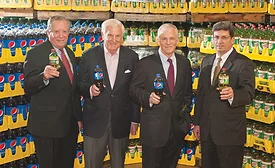Home » Keywords: » Balance Calories Initiative
Items Tagged with 'Balance Calories Initiative'
ARTICLES
Balance Calories Initiative halfway to national goal to reduce beverage calories by 20%
Read More
Report shows reduction of consumer calories from beverages
Keybridge found that calories for each person have decreased 10% since 2014
October 18, 2021
New report shows national reduction in beverage calorie consumption
Independent analysis marks third consecutive year of notable calorie declines
September 28, 2020
American Beverage Association marks 100th anniversary with eyes on the future
Association addressing sustainability, truck driver shortage with next initiatives
November 7, 2019
Sweetened beverage taxes present confusion
Beverage industry addresses sugar reduction through Balance Calorie Initiative
September 15, 2017
2017 Beverage Bottler of the Year: The Honickman Group
East Coast distributor helping to further Balance Calories Initiative
January 11, 2017
ABA addresses obesity crisis through Balance Calories Initiative
Association expands test and learn markets to parts of Mississippi and Alabama
October 10, 2016
Elevate your expertise in the beverage marketplace with unparalleled insights and connections.
Join thousands of beverage professionals today. Shouldn’t you know what they know?
JOIN NOW!Copyright ©2026. All Rights Reserved BNP Media.
Design, CMS, Hosting & Web Development :: ePublishing





